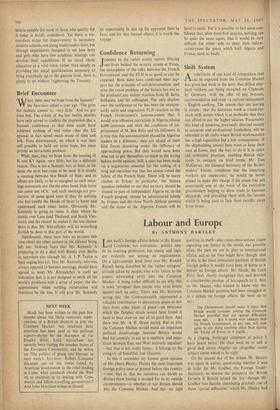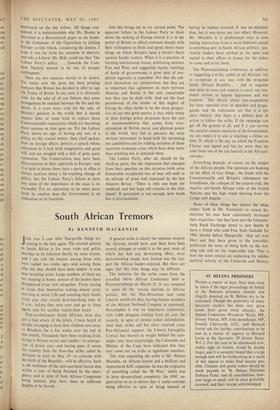Labour and Europe
By ANTHONY HARTLEY AST week's foreign affairs debate in the House of Commons was instructive: politics may be an exacting profession, but clarity and logic are evidently not among its requirements. On a light-comedy level there was Mr. Ronald Russell being disturbed by the 'rather arrogant' attitude taken by people who write letters to the papers advocating entry into the Common Market—it being rather difficult to see why this is more 'arrogant' than people who write letters against such an entry. There was Mr. Sorensen saying that 'the Commonwealth represented a valuable contribution to democratic peace as dis- tinct from other kinds of peace'—an utterance which the Delphic oracle would have found it hard to beat even on one of its good days. And there was Mr. A. E. Oram saying that to join the Common Market would mean an important political disadvantage 'because Britain would find her capacity to act as a mediator and nego- tiator between East and West seriously impaired' —but that is not really funny: it belongs to the category of beautiful, lost illusions.
In this it resembles my former good opinion of Mr. Denis Healey. Plainly the most important foreign policy issue at present before this country —one, that is, that we ourselves can decide as distinct from having it decided for us by outside circumstances—is whether or not Britain should join the Common Market. And this—no light question in itself—also raises most serious issues regarding our future in the world, our possible allies, the part we are to play in international affairs, and so on. One might hae thought that as this is the most immediate problem of British foreign policy it would have been at home in a debate on foreign affairs Mr. Heath, the Lord Privy Seal, clearly recognised this, and devoted a considerable portion of his speech to it. Not so Mr. Healey, who wanted to know why the Common Market question had been smuggled in to a debate on foreign affairs. He went on to say The Government should make it clear that Britain would consider joining the Common Market provided that our special difficulties were met. . . . But it seems very unlikely that the French Government, at any rate, will now agree to our doing anything other than signing the Treaty of Romc as it stands.
As a ringing, forthright statement of policy I have heard better. He then went on to talk a good deal about Angola—an altogether easier subject about which to be right.
On the second day of the debate Mr. Healey was again in action, questioning whether it was in order for Mr. Godber, the Foreign Under- Secretary, to discuss the prospects for British farmers if Britain joined the Six—though Mr. Godber was thereby elucidating precisely one of those 'special difficulties' which Mr. Healey had mentioned on the day before. All things con- sidered, it is understandable why Mr. Healey is described in a Beaverbrook paper as the leader 10 the Commons of the Opposition to joining Europe—a title which, considering the donors, I hope it was far from his intention to deserve; and why a Liberal, Mr. Holt, could say that 'The Labour Party's policy . . . [towards the Com- mon Market] seemed to be one of myopic nothingness.'
There are two separate morals to be drawn. For weeks now the press has been printing rumours that Britain has decided to offer to sign the Treaty of Rome. In any case, it is obviously vital, for the sake of all our futures, that some arrangement be reached between the Six and the Seven. It is even more vital for the sake of Britain's position in the world that it should acquire links of some kind to replace those Commonwealth connections which are becoming more tenuous as time goes on. Yet the Labour Party shows no sign of having any sort of a Policy on this crucial matter; their chief spokes- man on foreign affairs delivers a speech whose references to it lack both imagination and good Will. and are mingled with a deal of petty party contention. The Conservatives may have been ultra-cautious in their approach to Europe—and it is hard to blame them since a party in office is always cautious about a far-reaching change of Policy; but the Labour Party's failure to have any sense of the importance of the issue is in- excusable. For an opposition to be more para- lysed by caution than the Government is an abdication of its functions. And this brings me to my second point. The apparent failure in the Labour Party to think about the making of Europe (which it is in the power of Britain to affect) contrasts sharply with their willingness to think and speak about many things on which Britain's (and a fortiori their) opinion hardly matters. When it is a question of forming international forces, arbitrating between East and West, and suggesting regular meetings of heads of governments, a great deal of mis- placed ingenuity is expended. Not that the sub- jects themselves are unimportant; but they are so important that agreement on them between America and Russia is the only conceivable way they can be dealt with. And not the least paradoxical of the results of this neglect of Europe by what claims to be the more progres- sive of our two great parties is that, while many of their foreign policy proposals have the sort of unreasonableness that comes from over- estimation of British moral and physical power in the world, they fail to perceive the most obvious instrument to hand both for increasing our capabilities and for ridding ourselves of those recurrent economic crises which have done more than anything else to diminish them.
The Labour Party, after all, should be the thinking party, but the impression that emerged from their speeches on this occasion (with some honourable exceptions) was of men still sunk in an attitude of mind well expressed by the late Anuerin Bevan: 'There is only one hope for mankind, and that hope still remains in this little island.' If patriotism is not enough, how much less is provincialism.















































 Previous page
Previous page